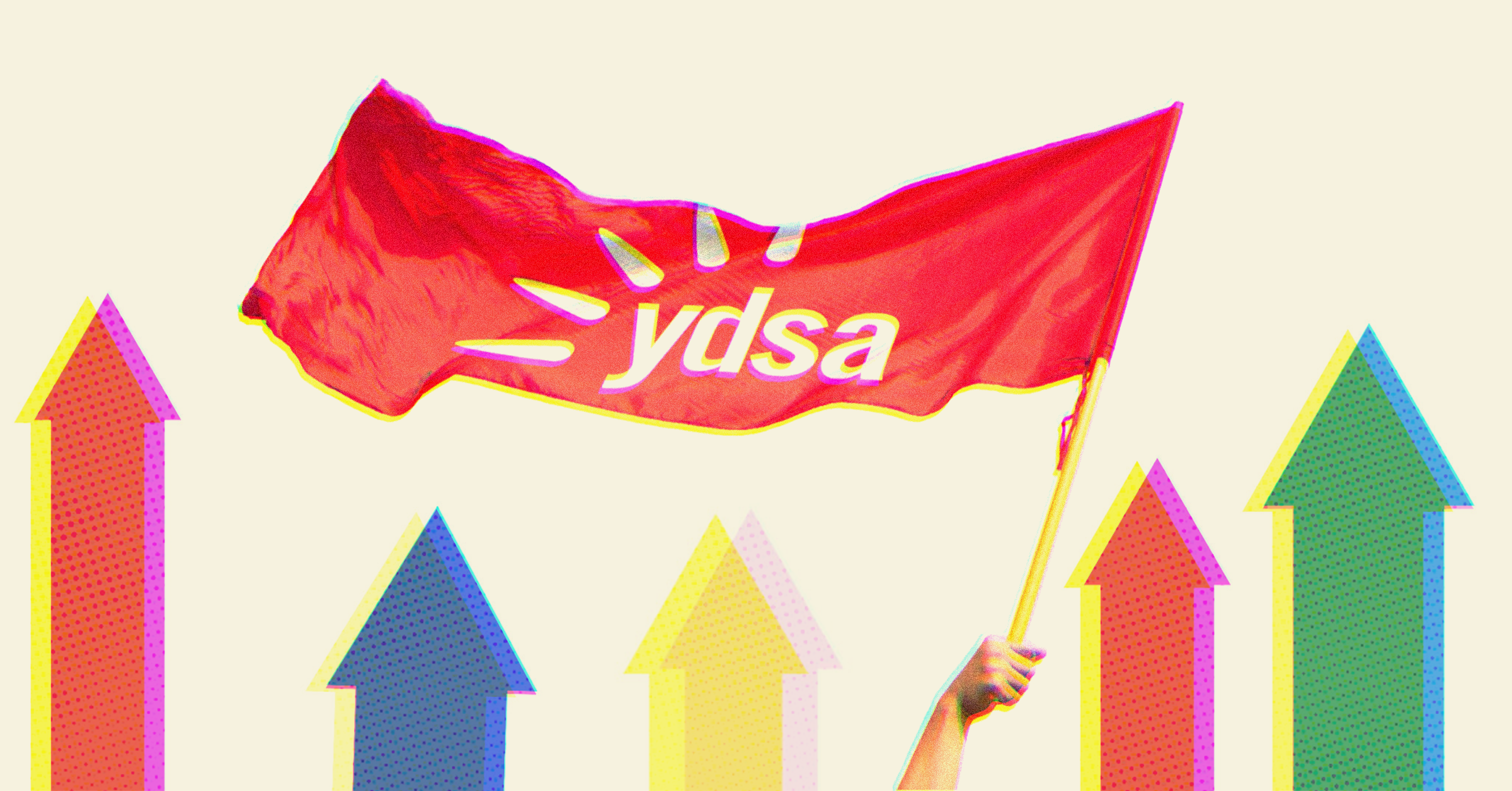Left-wing parties around the world have always had youth and student sections. These sections create an environment for young people to develop their politics and organizational skills through conferences, conventions, and campaigns at the local and national levels. YDSA is no different.
When speaking with representatives of several such youth wings during the 2021-2022 leadership term, we all agreed that participating in a youth organization that allowed us to make our own democratic decisions, instead of just being members of our parent organization, was instrumental for our political development. Autonomy, or the principle of self-governance, is a crucial component of political development for young socialists around the world. YDSA autonomy is not separatism. Instead it means building a stronger and bigger DSA for the long haul by creating space and providing resources for YDSA members to make their own decisions and develop themselves into lifelong socialist organizers.
YDSA is one of the most important organizations of the American left. We are tasked with recruiting, training, and developing many of the future leaders of the socialist and labor movements. The road to socialism will likely be long and uncertain. We cannot predict the precise contexts we will be navigating in the next ten, twenty, or thirty years, but no matter what the capitalist class throws at us, we will be far better off with thousands of experienced socialist organizers who came to our movement and honed their skills through YDSA. If we take our mission seriously, we must make decisions about our resources and priorities based on their strategic importance. While YDSA may be numerically smaller than DSA, we should make decisions about our resources not based on proportionality of members but on what will get us closer to socialism.
Besides its role in developing new socialist and labor movement leaders, YDSA is already one of the most dynamic and engaged segments of DSA. Despite stagnating membership at the national level of DSA, YDSA’s membership has grown by 150% since our 2020 convention. This growth has come as YDSA chapters become more sophisticated in their campaign work, structures, and membership development practices. In order to build on our past few years’ successes, DSA convention delegates should vote “yes” on the YDSA Consensus Resolution, and YDSA delegates should endorse this position, sending a strong message to DSA by voting “yes” on “Resolution 18: Support for a Growing YDSA.”
YDSA on the Front Lines
Many of our largest chapters, including University of Central Florida YDSA with more than 150 members, are located in the South, an area where DSA remains relatively small. Some YDSA chapter leaders are spearheading new DSA chapters in their communities. Leaders of the University of Florida YDSA chapter, for example, have formed an official DSA Organizing Committee in Gainesville. YDSA members have been on the front lines against right-wing assaults, protesting attacks on academic freedom in Florida and anti-trans legislation in Kentucky, for example.
Last fall, YDSA worked in coalition with other student groups nationally and locally to hold a day of action for reproductive justice in response to the Supreme Court’s Dobbs v. Jackson decision. At more than fifty campuses across thirty states, students walked out of class to protest the decision and demand bodily autonomy. The day of action led to successful campaigns at Columbia-Barnard University, New York University (NYU), and Wesleyan University where YDSA chapters won access to medication abortion (Columbia) and free abortion for all students (NYU and Wesleyan). These campaigns have improved access to abortion services for tens of thousands of students.
YDSA has played an outsized role in the revitalized American labor movement. YDSA members have played a crucial role in the rise of the undergraduate student worker unionization movement. In the past two years, YDSA members have organized or filed for unions collectively representing more than 4,000 workers, with union drives underway at additional campuses. This includes the University of Oregon Student Workers Union, a wall-to-wall union representing thousands of workers. Some of these unions have won impressive contracts, especially at Dartmouth College, where the Student Worker Collective (SWC) won a contract which raised starting pay for dining workers to $21 per hour and retained the right to sympathy and unfair labor practice strikes through the length of the contract. YDSA members have also supported creation of the Student Worker Action Network (SWAN) — a coalition of student worker unions across the country that shares resources, collectively strategizes, and grows the movement.
YDSA members have been at the forefront of labor solidarity work on their campuses, providing crucial support to unions during strikes, fights for recognition, and collective bargaining. This includes University of California chapters who stood with 48,000 striking workers across the UC system last fall, engaging tens of thousands of students through petitions, rallies, and turnout to the picket lines.
When these members graduate from YDSA, they will already have labor organizing experience, including organizing conversations, workplace mapping, National Labor Relations Board filings, labor law, bargaining, and contract enforcement, that they can bring to their future workplaces. YDSA’s emphasis on the Rank-and-File Strategy encourages and supports these members to take jobs in strategic sectors like education, healthcare, and logistics, joining the ranks of current and former YDSA members who are active in union reform caucuses like Teamsters for a Democratic Union and Unite All Workers for Democracy. For two years in a row, YDSA has organized the largest socialist labor organizing series in the United States: Red Hot Summer. More than 1,700 young people have signed up to learn how to organize their workplace and stand with striking workers across both iterations of the program, seeding new union drives and recruiting new members to YDSA.
YDSA is also uniquely positioned to help diversify DSA. YDSA chapters are part of racially and ethnically diverse communities on their campuses and some chapters organize in coalition with identity-based organizations on their campuses. At NYU, organizations like the Asian American Political Activism Coalition, Pakistani Student Association, and Queer Union supported our solidarity efforts when graduate student workers went on strike. With the recent hiring of a second YDSA staffer, YDSA has had more resources to devote to building chapters at Historically Black Colleges and Universities, community colleges, and public universities. Building strong YDSA chapters at these schools will develop a new layer of thousands of working-class socialist organizers.
Building a Powerful YDSA
YDSA is already engaged in monumental organizing work, despite its relatively small size and budget from DSA. If we believe in the strategic importance of YDSA, we need to back it up with resources and meaningful control over the decisions that affect our organizing. That means YDSA deserves a budget that includes stipends for National Coordinating Committee members, allowing our elected leaders to spend more of their time running our organization, and making being on the NCC more accessible to our working-class members. That means we need to commit to allocating organizing time from YDSA staff and NCC members to meaningfully support our democratically set priorities. That means our chapters need fundraising support from their DSA chapter and representative positions on their steering committees to allow members to attend national YDSA events and connect them to their DSA chapters.
Not only are these measures crucial to make our organizing projects successful, they set stakes for the decisions we make, and teeth for the priorities we’ve democratically set. If we fail to trust members and leaders of YDSA to make strategic decisions with meaningful stakes and if we fail to commit resources and decision-making power to our organization, it will make the task of developing leaders harder. When we develop leaders in our local chapters, we do it by trusting new members to take on work. Developing leaders at the national level is no different. We need to trust young organizers to take on responsibility and grapple with political and organizational questions.
Some YDSA members have argued against proposals to expand YDSA autonomy, instead advocating for further integrating YDSA into DSA. This integration includes measures such as reducing the size of YDSA’s budget and mandating that YDSA national committees are connected to their DSA counterparts by using the same communication channels and adapting the DSA committee’s work to the campus context.
These proposals run antithetical to the practices that have allowed YDSA to grow. YDSA’s expanded funding as part of the 2023 budget, including semesterly (but not monthly) stipends for national leaders, allowed NCC members to quit part-time jobs and devote more of their time to leading YDSA. Furthermore, retaining autonomy from DSA national committees allows YDSA the flexibility to respond to shifting political conditions and experiment with new projects and organizing models. Subsuming these committees within DSA national committees would give YDSA less control over its own work, making it less effective.
Instead of tasking YDSA national committees with translating DSA national committee work to the campus contexts, we should seek to build relationships between YDSA and DSA that do not erode YDSA’s autonomy. DSA’s National Labor Commission, for example, has had representatives from YDSA’s Labor Committee for a few years. YDSA’s Mentor Coordinating Committee is another great example of the ways in which YDSA already works to connect itself with DSA. The MCC helps identify, recruit, and develop DSA members to mentor YDSA chapters.
Fighting for a strong and well-resourced YDSA is not advocating for YDSA separatism. Believing that YDSA should be able to make decisions about our work does not make for a weaker DSA. Believing that YDSA should be funded proportionally to its strategic importance, but still a fraction of DSA’s overall national budget, does not discredit the work of our comrades across DSA or “waste” our collective resources. YDSA autonomy — the ability to make decisions about the things that affect our work and NOT separating from DSA — will make for a stronger YDSA, and in turn a stronger DSA through the generation of organizers that we develop. In order to strengthen YDSA, DSA, and the socialist movement as a whole for the long haul, delegates to the YDSA and DSA conventions should vote “Yes” on providing YDSA the resources and autonomy it needs.




